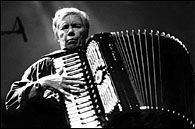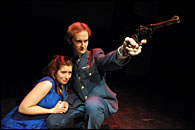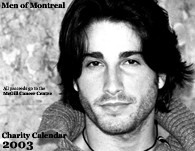On campus
A musical finger in every pi
 Pauline Oliveros
Pauline OliverosPHOTO: pieter_kers@hotmail.com |
|
"Babies are the best Deep Listeners."
Seventy-year-old experimental musician, respected academic and accordionist Pauline Oliveros founded Deep Listening, "a method to listen in every possible way to everything possible to hear no matter what you are doing. Such intense listening includes the sounds of daily life, of nature, of one's own thoughts as well as musical sounds."
"Hearing is passive. We can hear without listening. This is the state of being tuned out --unaware of our acoustic ecology."
Philosophy professor Eric Lewis is kick-starting his department's Pi Project (Project on Improvisation) with lectures/demos and performances by acoustic wonders The Space Between Trio and Fred Frith at Salla Rossa. Lewis received a SSHRC research development initiative grant to start up the project.
The Space Between Trio consists of Oliveros on a Just intonation acordian, Philip Gelb on shakuhachi (Japanese bamboo flute), and McGill graduate Dana Reason tickling the ivories on piano. Their compositions and improvisation use timbre and texture for structure; they use the instruments' discrepancies in tuning systems become to their advantage.
Composer and instrumentalist Frith situates himself in the space where rock music and new music meet. He co-founded the British underground band Henry Cow, and moved to New York in the '70s and jammed with the likes of John Zorn and Ikue Mori.
Lewis says,"Part of Pauline's Deep Listening philosophy involves the fact that when in listening environment, you're listening to everything at the time, the ambient noise, the sound of your own breathing, you listen to your thoughts." Lewis says. "Pauline's music can be quite meditative, and Fred can be rowdy if he's in the mood."
Monday, Dec. 9, 1-3 pm
Pauline Oliveros --Improvisation Through Deep Listening. Philip Gelb -- Timbral Approaches to Composition and Improvisation. Dana Reason -- Navigable Structures and Transforming Mirrors: Improvisation and Interactivity
To be followed by a discussion and a brief performance/demonstration. The Trio will perform that evening at 9 pm.
Friday, Dec. 13, 1-3 pm
Fred Frith -- Trouble With Traffic. Fred Frith and Friends will perform that evening at 9 pm.
The talks are free of charge, the performances require tickets. All events are at La Salla Rossa, 4848 St-Laurent. For info call 284-3804.
Tommy can you hear me?
 Music faculty staffer Erika White and physics student Steve Kennedy
Music faculty staffer Erika White and physics student Steve KennedyPHOTO: Owen Egan |
|
Get out the platform shoes. A major '70s musical phenomenon is getting its Montreal premiere at McGill this week.
The Who's Tommy is about to rock its way to Moyse Hall for six performances. McGill alumnus Raymond Zilberberg, who directed Cabaret at the venue last year, is returning to direct and co-produce Tommy.
"Tommy is a huge show and our cast has really stepped up to the plate for this production," says Zilberberg. The musical will feature a 24-strong cast, including 14 McGill students.
For the record, the musical Tommy was born in 1969 as a concept rock album by the British rockers, The Who. By 1974, the record was transformed into a hallucinogenic film, starring a flamboyant Elton John in three-foot-high platform shoes.
In 1993, Tommy debuted on Broadway, and won five Tony Awards. It is the story of a child who turns deaf, dumb and blind after witnessing his father kill his mother's lover. Despite his adversity, he becomes a pro-pinball player.
Tommy's gaming skills turn him into a star. But when Tommy gets caught up in his fame, his fans desert him and he turns back to his family. "Tommy is the story of depravity to enlightenment," explains Zilberberg.
The McGill performance is chock full of lighting and technical effects, including thousands of original slides from the Broadway run. "Tommy is a demanding and technical show to produce," Zilberberg says. "It's such an energetic show, you can feel it in your bones."
"Audiences will be leaving with a smile on their faces."
Tommy is co-produced by Zilberberg's One Foot Productions, as well as Hillel Jewish Student Centres and the Montreal Athletic Association and runs at Moyse Hall (Arts Bldg.) on Nov. 21, 23, 24, 27, 28 and 30. Students $10, adults $15. Call 845-9171 for tickets.
Taking physics by Stormer
If you got the chance to meet a Nobel Prize winner, what would you ask? McGill students and members of the public will get a chance when Horst Stormer, co-winner of the 1998 Nobel Prize in Physics comes to McGill to deliver the annual Anna McPherson lecture and seminar.
"The public lecture is about the inventions and physical devices that were put in place that make our telephone calls, television and internet possible," explained physics professor David Hanna, who organized the lecture this year.
Hanna explained that Bell Labs, where Stormer has spent most of his career was the birthplace of many of the key technologies that go into communications technologies we take for granted. Even a particle physicist like Hanna is impressed by the progress these innovations have allowed.
"One of the thing that amazes me is, when I was a kid, to call Europe was $50 bucks a minute. Now you can call there cheaper than you can call from a pay phone. That's one of the things he's going to emphasize -- you have this incredible connectedness and bandwidth that stands on the back of some fairly basic physics discoveries that were made in a very esoteric lab."
Horst Stormer "Physics in the Communication Industry." Thursday, November 21 at 7:30 pm, in the Stephen Leacock Building, Room 132
The colloquium, 'Fractional Charges and Other Tales from Flatland' (for a scientific audience at a general level), Friday, November 22 at 2:30 pm in the Macdonald-Harrington Building Room G-10.
 |
|
The "Men of Montreal" charity calendar will be at the McGill bookstore soon, in time for Christmas. The calendar was put together by McGill student Kristen Bussandri and features McGill students as well as other men-about-town. Proceeds go to the McGill Cancer Centre. Read about how this calendar was put together in the Reporter's December issue.
The green womb
As an environmentalist Sandra Steingraber is less concerned with "macro-issues" like climate change or ozone depletion, and more concerned with a much smaller environment -- the womb.
 |
|
Steingraber will be the first of two Beatty lecturers who have been invited to speak at McGill for the Rachel Carson Series of environmental talks, named after the woman whose writings were credited with giving birth to the modern environmental movement. Steingraber's talk is titled "Protecting the First Environment: The Ecology of Pregnancy and Childbirth."
"The idea was to have an environmental series commemorate the fortieth anniversary of the publication of Silent Spring," said Teresa Alper, acting communications officer, Office of the Vice-Principal (Research), and acting coordinator of the Beatty Memorial Lectures Series.
Alper explained that Steingraber is an internationally recognized expert on environmental links to cancer. As a scientist (she has a PhD in biology), a cancer survivor, environmental advocate and a mother -- not to mention a poet -- Steingraber's writings have won her much respect in the environmental field -- the Sierra Club has called her the "next Rachel Carson."
"In her latest book, Having Faith she basically talks about all types of environmental assaults that can occur to the growing fetus. She talks about embryology and how different compounds affect the fetus at different times -- it's really interesting," said Alper.
Sandra Steingraber's talk will be on Tuesday, December 3, at 7:30 p.m., Leacock 132. For information call 398-2827 (McGill School of Environment, co-sponsor of the Steingraber lecture).
Meet the press
The question of media ownership has never been so much on the public agenda as it has over the last few years in Canada. The McGill Institute for the Study of Canada wants to get in on the debate. The institute will examine the question of media ownership with a series of public lectures.
"This year the institute is doing a year of reflection on Canada's media that will culminate in a conference in February," said Lynne Darroch, public education officer at MISC. The first speaker in the series is Le Soleil president and publisher Alain Dubuc.
"We've asked Mr. Dubuc to give the big inaugural talk that will begin this process of investigation, and he'll also be at the conference."
Dubuc, an award-winning journalist who also used to be an editor at La Presse, will take a stand contrary to what many in Canada would take to be the truth. His talk is entitled "Who controls the media? Nobody."
The issue of media ownership in Canada is complicated by a maze of federal and provincial jurisdictions. The institute does not want to argue a position on the issue, but rather to serve as a forum for discussion. This is why Dubuc makes an ideal speaker, according to Darroch.
"Obviously, Mr. Dubuc knows quite a bit about this since he's run two newspapers in Montreal and Quebec City and he's a great speaker," said Darroch.
"He's reflective, rather than argumentative, and that is what the institute is all about."
Alain Dubuc will present the Mallory lecture "Who Controls the Media? Nobody" Thursday, November 28, at 4 pm in Room 232 of the Leacock Building.

